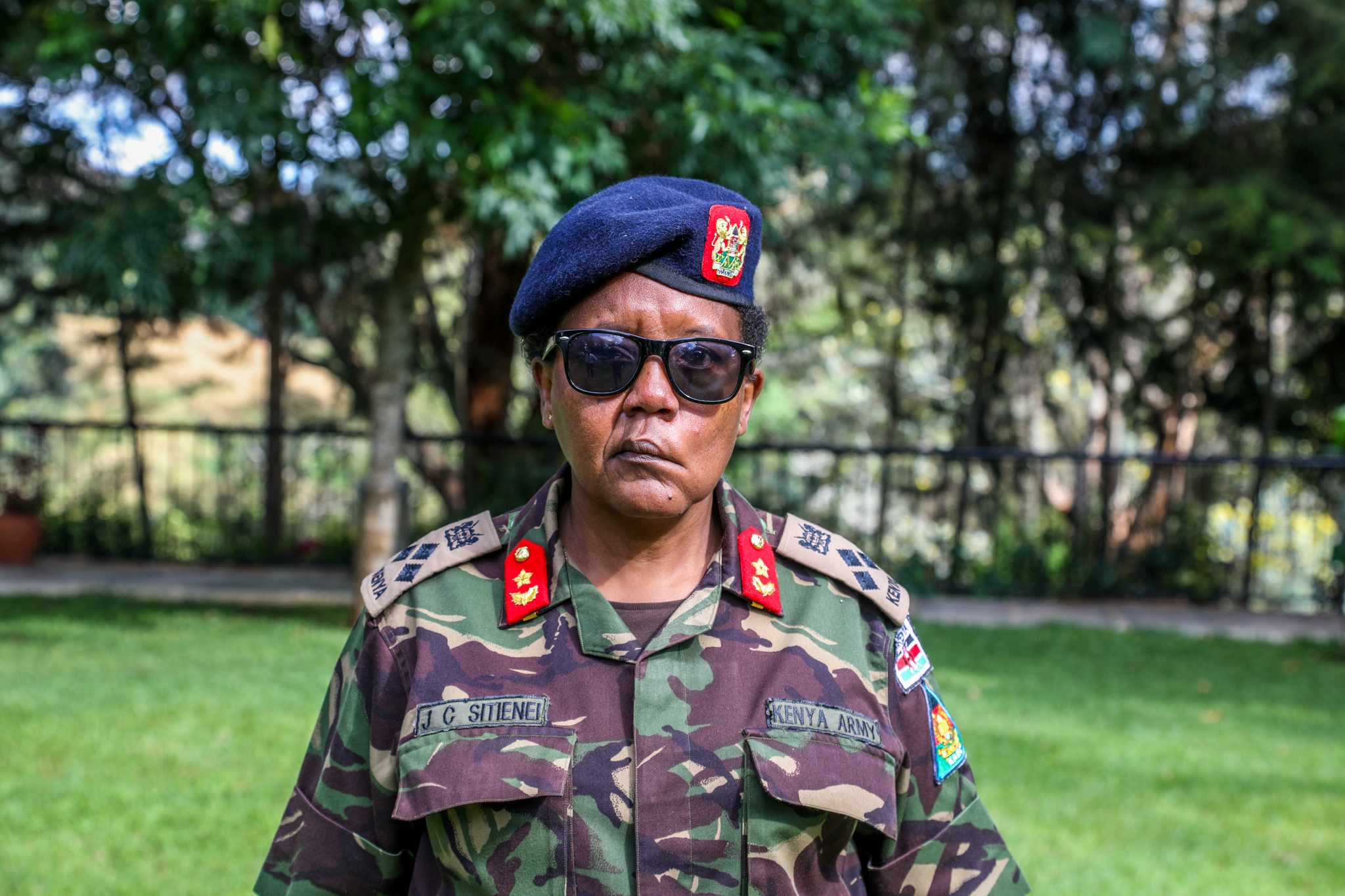In the words of Brigadier Joyce Sitienei: “Women are an invaluable asset to peacekeeping missions. They bring confidence to the community”
Date:
Brigadier Joyce Sitienei is one of the most senior ranking female officers in the Kenyan military. She is the Director of the International Peace Support Training Centre (IPSTC) in Nairobi, Kenya, a centre of excellence mandated to build capacity in international peace support operations that involve the military, police and civilian personnel. Since 2015 she has led the organisation’s efforts to integrate gender fully into peacekeeping operations.

![]() I graduated from the Kenya military academy as an officer in 1995 whereupon I was immediately deployed in the Women Service Corps (WSC). This was a women-only outfit of 400 ladies who only performed auxiliary duties. Fast forward to 1999, and the WSC was disbanded, and women were allowed to join the army, air force, and navy. Since then, their numbers in the Kenya military has significantly grown. This was a deliberate and positive move that provided women greater opportunities to participate in the country’s security sector and more specifically in the military.
I graduated from the Kenya military academy as an officer in 1995 whereupon I was immediately deployed in the Women Service Corps (WSC). This was a women-only outfit of 400 ladies who only performed auxiliary duties. Fast forward to 1999, and the WSC was disbanded, and women were allowed to join the army, air force, and navy. Since then, their numbers in the Kenya military has significantly grown. This was a deliberate and positive move that provided women greater opportunities to participate in the country’s security sector and more specifically in the military.
Following UNSCR 1325, we have seen many countries adopting their own action plans to increase women’s participation in peacekeeping. Approximately 9% of military contributions to peacekeeping operations are women. There is need to do more to increase this representation. The UN uniformed gender parity strategy is aiming for 25% by 2028. That means member states must do a lot of work in terms of recruiting, preparing, and deploying female personnel to ensure they are better represented and can contribute to operational effectiveness.
My deployments to Rwanda as part of the Kenya Military Assistance Training Team (KMATT) in 2002-2003 and the Democratic Republic of the Congo as a Military Observer in 2003-2004 really opened my eyes to how conflicts impact women differently. In the DRC we would visit villages that had suffered attacks, where families were left to deal with the trauma associated with rape and displacement. This had a great impact on me as I witnessed how families suffered. It made me want to do more to bring gender perspectives into peace operations.
Women are an invaluable asset to peacekeeping missions. Victims of conflict related violence find it easier to speak about their issues to fellow women. Even men often find it easier to share their issues with women. Female peacekeepers act as positive role models to the communities that are trying to recover. They bring confidence and trust to communities and inspire women and girls that they can also participate in their country’s security – the military, the police. It was gratifying to see young girls and children get excited to see female military personnel among the peacekeepers, demonstrating how important and impactful it was.
In Kenya we have made important achievements that we are working to build on. The first step was integrating women in the three services. In 2017 we developed a gender policy that included women’s increased participation in peacekeeping operations. Soon after, we saw an increase of women in peacekeeping. We have courses that specifically target female personnel like the Female Military Officer’s Course run by UN Women at IPSTC, the Female Soldiers Course and courses on women leadership and community peacebuilding. All these aim to ensure women have dedicated training. Women now make up 19% of Kenya’s deployments peace operations.
Most militaries around the world are the same, we’re going through this transformation together – whether European or African countries – we are all facing the challenge of integrating gender in our institutions. Militaries are very conservative, so change doesn’t come easy. We need to continue creating awareness and supporting institutions that deploy peacekeepers by ensuring they have structures and policies to prepare women for gainful participation.
UN Women support to IPSTC helped shape the development of the Ministry of Defence Gender policy in 2017 in Kenya. Research studies have also been produced through this partnership, on gender integration into transformative justice and refugee protection in East Africa.